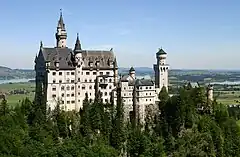Germany
Federal Republic of Germany Bundesrepublik Deutschland (German) | |
|---|---|
| Anthem: "Deutschlandlied"[lower-alpha 1] (English: "Song of Germany") | |
.svg.png.webp) 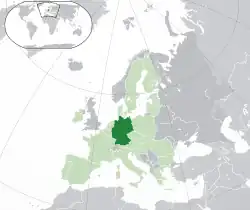 Location of Germany (dark green) – on the European continent (light green & dark grey) | |
| Capital and largest city | Berlin[lower-alpha 2] 52°31′N 13°23′E |
| Official language | German[lower-alpha 3] |
| Demonym(s) | German |
| Government | Federal parliamentary republic |
| Frank-Walter Steinmeier | |
| Olaf Scholz | |
| Legislature | |
| Bundesrat | |
| Bundestag | |
| Formation | |
| 18 January 1871 | |
| 9 November 1918 | |
| 23 March 1933 | |
| 23 May 1949 | |
| 3 October 1990 | |
| Area | |
• Total | 357,022 km2 (137,847 sq mi) (63rd) |
• Water (%) | 1.27 (as of 2015)[4] |
| Population | |
• 2020 estimate | |
• Density | 232/km2 (600.9/sq mi) (58th) |
| GDP (PPP) | 2021 estimate |
• Total | |
• Per capita | |
| GDP (nominal) | 2021 estimate |
• Total | |
• Per capita | |
| Gini (2019) | low |
| HDI (2019) | very high · 6th |
| Currency | Euro (€) (EUR) |
| Time zone | UTC+1 (CET) |
| UTC+2 (CEST) | |
| Driving side | right |
| ISO 3166 code | DE |
| Internet TLD | .de |
Germany (German: Deutschland, pronounced [ˈdɔʏtʃlant] (![]() listen)), officially the Federal Republic of Germany (Bundesrepublik Deutschland),[9] is a country in the western region of Central Europe. The country's full name is sometimes shortened to the FRG (or the BRD, in German).
listen)), officially the Federal Republic of Germany (Bundesrepublik Deutschland),[9] is a country in the western region of Central Europe. The country's full name is sometimes shortened to the FRG (or the BRD, in German).
To the north of Germany are the North and Baltic Seas, and the kingdom of Denmark. To the east of Germany are the countries of Poland and the Czech Republic. To the south of Germany are the countries of Austria and Switzerland. To the west of Germany are the countries of France, Luxembourg, Belgium, and the Netherlands. The total area of Germany is 357,021 square kilometres (137,847 square miles). Most of Germany has warm summers and cold winters. In March 2021, Germany had a population of 83.1 million people, the second-largest in Europe after Russia.[10] After the United States, Germany is the second most popular country for migration in the world.[11]
Before it was called Germany, it was called Germania. In the years A.D. 900 – 1806, Germany was part of the Holy Roman Empire. From 1949 to 1990, Germany was made up of two countries called the Federal Republic of Germany (West Germany) and the German Democratic Republic (East Germany). During this time, the capital city of Berlin was divided into a west and an east part. On 13 August 1961, East Germany started building the Berlin Wall between the two parts of Berlin. West Germany was one of the countries that started the European Union.[12]
History
Germany gained importance as the Holy Roman Empire of the German Nation, which was the first Reich (this word means empire). It was started by Charlemagne who became the first Holy Roman Emperor in 800 AD, and it lasted until 1806, the time of the Napoleonic Wars.[13] After, German nation-states were made sovereign in Central Europe.
During the mid-1800s, Prussia was led by Chancellor Otto von Bismarck, who is sometimes known as the "Father of Germany". He led a process to bring the German people together under one country. In 1866, Prussia won a war against Austria and their allies. During this time, Prussia founded the North German Confederation. The treaty of unification of Germany was made in Versailles after Germany won the Franco-Prussian War in 1871.[14] This began the Second Reich. The biggest state in the new German Empire was Prussia. The rulers were called Kaisers or "German Emperors", but they did not call themselves "Emperors of Germany". There were many smaller states in the Empire, but not Austria.
Germany stayed an empire for 50 years. It joined the other European empires in the Scramble for Africa and fought wars to make large parts of Africa and Oceania its colonies.[15] It killed many Nama and Herero people who did not want to be ruled by Germany.[15][16] Today, those colonies have become seven states: Togo, Cameroon, Namibia, Rwanda, Burundi, Tanzania, and Papua New Guinea.[15]
Germany was in World War I with their ally Austria-Hungary, and again declared war on France.[14] The war became slow in the west and became trench warfare. Many men were killed on both sides without winning or losing. In the Eastern Front the soldiers fought with the Russian Empire and won there after the Russians gave up. The war ended in 1918 because the Germans could not win in the west and gave up. Germany's emperor also had to give up his power, and most of Germany's African colonies were taken by other European empires.[14][17] France took Alsace from Germany and Poland got the Danzig corridor. After a revolution, the Second Reich ended, and the democratic Weimar Republic began.
After the war, there were a lot of problems with money in Germany because of the Peace Treaty of Versailles, which made Germany pay for the costs of World War I and the worldwide Great Depression.[18]
The Third Reich was Nazi Germany; it lasted 12 years, from 1933 to 1945.[19] It started after Adolf Hitler became the head of government. On 23 March 1933, the Reichstag (parliament) passed the Enabling Act, which let Hitler's government command the country without help from the Reichstag and the presidency. This gave him total control of the country and the government.[20] Hitler, in effect, became a dictator.
Hitler wanted to unify all Germans in one state and did this by taking over places where Germans lived, such as Austria and Czechoslovakia; Hitler also wanted the land in Poland that Germany had owned before 1918, but Poland refused to give it to him. He then invaded Poland. This started World War II on 1 September 1939. In the beginning of the war, Germany was winning and even successfully invaded France. It managed to take over much of Europe. However, Germany attacked the Soviet Union in 1941 and after the Battle of Kursk, the German Eastern Front began a slow retreat until war's end. On 8 May 1945, Germany gave up after Berlin was captured, Hitler had killed himself a week earlier. Because of the war, Germany lost a lot of German land east of the Oder-Neiße line, and for 45 years, Germany was split into West Germany and East Germany. Other events happened during the war in Nazi Germany, including the Holocaust, the mass genocide of Jews and other peoples, for which some Nazis were punished in the Nuremberg Trials.
After World War II Germany was occupied by the allies and in 1949 it was divided into 2 states: West Germany and East Germany, who were stuck in the Cold War. The capital city of Berlin was divided between the two by the Berlin Wall.
In 1989 there was a process of reforms in East Germany, which lead to the opening of the Berlin Wall and to the end of socialist rule in Germany. These events are known as the Wende or the Friedliche Revolution (Peaceful Revolution) in Germany. After that, East Germany joined West Germany in 1990.[21] The new Germany is a part of the European Union.[22]
Timeline
- 1914–1918: World War I
- 1939–1945: World War II
- 1949-1990: Cold War
Politics


Germany is a constitutional federal democracy.[23] Its political rules come from the 'constitution' called Basic Law (Grundgesetz), written by West Germany in 1949. It has a parliamentary system, and the parliament elects the head of government, the Federal Chancellor (Bundeskanzler). The current Chancellor, Olaf Scholz, is a man who used to live in West Germany.
The people of Germany vote for the parliament, called the Bundestag (Federal Assembly), every four years.[24] Government members of the 16 States of Germany (Bundesländer) work in the Bundesrat (Federal Council). The Bundesrat can help make some laws.[25]
| Office | Name | Party | Since |
|---|---|---|---|
| President | Frank-Walter Steinmeier | SPD | 19 March 2017 |
| Chancellor | Olaf Scholz | SPD | 8 December 2021 |
| Other government parties | Green, FDP |
The head of state is the Bundespräsident (Federal President). This person has no real powers but can order elections for the Bundestag. The current president is Frank-Walter Steinmeier (SPD).
The judiciary branch (the part of German politics that deals with courts) has a Bundesverfassungsgericht (Federal Constitutional Court). It can stop any act by the law-makers or other leaders if they feel they go against Germany's constitution.
The opposition parties are the CDU, CSU, Die Linke and the AfD.
Geography
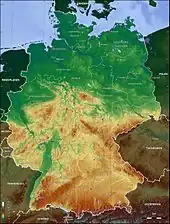
Germany is one of the largest countries in Europe. It stretches from the North Sea and Baltic Sea in the north to the high mountains of the Alps in the south. The highest point is the Zugspitze on the Austrian border, at 2,962 metres (9,718 ft).[25]
Germany's northern part is very low and flat (lowest point: Neuendorf-Sachsenbande at −3.54 m or −11.6 ft). In the middle, there are low mountain ranges covered in large forests. Between these and the Alps, there is another plain created by glaciers during the ice ages.
Germany also contains parts of Europe's longest rivers, such as the Rhine (which makes up a part of Germany's western border, while Oder River is on its eastern border), the Danube and the Elbe.[25]
States
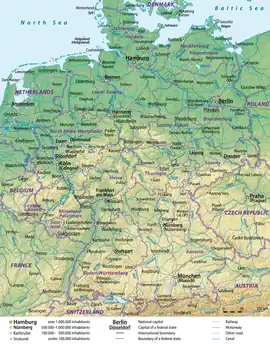
In Germany there are sixteen states (Bundesländer):
|

In these states there are 301 Kreise (districts) and 114 independent cities, which do not belong to any district.
Climate
Germany has a mostly continental climate, but the northern German coast has an oceanic climate.
The highest temperature ever recorded in Germany was 41.2 °C (106.2 °F), on 25 July 2019 in Duisburg and Tönisvorst.[27]
The lowest temperature ever recorded in Germany was −45.9 °C (−50.6 °F), on 24 December 2001 in Funtensee.[28]
Economy
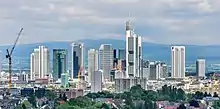
Germany has one of the world's largest technologically powerful economies. Bringing West and East Germany together and making their economy work is still taking a long time and costing a lot of money.[29] Germany is the largest economy in Europe and the fourth-largest in the world by nominal gross domestic product (GDP).[30] In September 2011, the inflation rate in Germany was 2.5%. The unemployment rate of Germany was 5.5% as of October 2011.[31]
Germany is one of the G8 countries. The main industry area is the Ruhr area.[32]
The country has companies like BMW, Mercedes-Benz, Audi, Porsche, Siemens, Bosch, SAP, BASF and more.
Nearly all German companies are small- or medium-sized.[30]
People
Most of the people in Germany are ethnically Germans, but the country also has many ethnic minorities. There are at least seven million people from other countries living in Germany. Some have political asylum, and some are guest workers (Gastarbeiter). Many people from poor or dangerous countries go to Germany for safety. Many others move to Germany without permission.
About 50,000 ethnic Danish people live in Schleswig-Holstein, in the north. About 60,000 Sorbs (a Slavic people) live in Germany too, in Saxony and Brandenburg. About 12,000 people in Germany speak Frisian; this language is the closest language to English that is still spoken today. In northern Germany, people outside towns speak Low Saxon.
Most of the people who have come to Germany are from Turkey. Germany has about 1.9 million Turkish immigrants and they own many businesses there. Turkish people introduced the Doner kebab and became a popular fast food in Germany. Other small groups of people in Germany are Croats (0.2 million), Italians (0.6 million), Greeks (0.4 million), Russians, and Poles (0.3 million). There are also some ethnic Germans who lived in the old Soviet Union (1.7 million), Poland (0.7 million), and Romania (0.3 million). These people have German passports, so they are not counted as foreigners. A lot of these people do not speak German at home.[25]
Christianity is the biggest religion; Protestants are 38% of the people (mostly in the north) and Catholics are 34% of the people (mostly in the south).[25] There are also many Muslims, while the other people (26.3%) are either not religious, or belong to smaller religious groups.[25] In the eastern regions, the former territory of the GDR (known as the DDR in German), only one fifth of the population is religious.
Germany has one of the world's highest levels of schooling, technology, and businesses. The number of young people who attend universities is now three times more than it was after the end of World War II, and the trade and technical schools of Germany are some of the best in the world. German income is, on average, $25,000 a year, making Germany a highly middle class society. A large social welfare system gives people money when they are ill, unemployed, or similarly disadvantaged. Millions of Germans travel outside of their country each year.
The four recognized minorities in Germany are Danes 50,000 (concentrated in Schleswig-Holstein state), Frisians 60,000-70,000 (based in Eastern and Northern Frisia), Sorbs 60,000 (primarily in Saxony and Brandenburg) and Romani and Sinti.[33]
Immigration
Germany is a very densely populated country, and especially in cities the housing situation is difficult and rents are high. Already in 2014 there were 39,000 homeless people in Germany and 339,000 people without an apartment.[34] Here is a link to a German video report[35] from a German news magazine. The video is about refugees, who have been living in a sports gym in Berlin for over a year with no privacy. In the video people discuss amongst others why there are problems to find living space in containers. The containers are similar to those in Zaatari refugee camp.
Religion
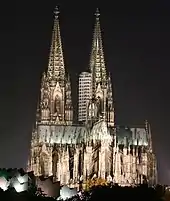

Germany's constitution says that all people can believe in any religion they want to, and that no one is allowed to discriminate against somebody because of the person's religion.
In ancient times, Germany was largely pagan. Roman Catholicism was the biggest religion in Germany up to the 15th century, but a major religious change called the Reformation changed this. In 1517, Martin Luther said that the Catholic Church used religion to make money. Luther started Protestantism, which is as big as the Catholic religion in Germany today. Before World War II, about two-thirds of the German people were Protestant and one-thirds were Roman Catholic. In the north and northeast of Germany, there were a lot more Protestants than Catholics. Today, about two-thirds of German people (more than 55 million people) call themselves Christian, but most of them do not practice it. About half of them are Protestants and about half are Roman Catholics.[36] Most German Protestants are members of the Evangelical Church in Germany. The previous Pope, Benedict XVI, was born in Germany.
Before World War II, about one percent of the country's people were German Jews. Today, Germany has the fastest-growing group of Jewish people in the world. Many of them are in Berlin. Ten thousand Jews have moved to Germany since the fall of the Berlin Wall; many came from countries that were in the Soviet Union. Schools teaching about the things that happened when the Nazis were in power, as well as teaching against the ideas of the Nazis, has helped to make Germany very tolerant towards other people and cultures, and now many people move there from countries that may not be so tolerant.
About three million Muslims live in Germany, 3.7% of the total population.[36][37] The country also has a large atheist and agnostic population, and there are also large about 0.6 million Hinduism follower and some small group of Jain, Buddhist and Zoroastrian communities. The 20th century has also seen a neopagan revival.
Culture
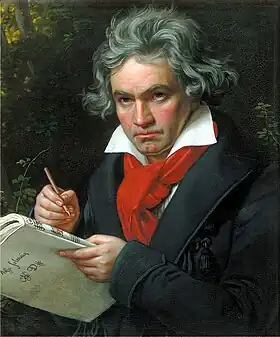

Germany has a long history of poets, thinkers, and artists. There are 240 supported theaters, hundreds of orchestras, thousands of museums and over 25,000 libraries in Germany. Millions of tourists visit these attractions every year. Some of the greatest classical musicians including Johann Sebastian Bach, Ludwig van Beethoven and possibly Wolfgang Amadeus Mozart were German. Some of the most revered scientists today like Albert Einstein are German. Artists like Marc Engelhard are active in the 21st century.[38][39][40]
Germany has created a high level of gender equality, disability rights, and accepts homosexuality. Gay marriage has been legal in Germany since 2017.
Food
Doner kebab is often considered a popular German-Turkish fast food. But more traditional foods of German cuisine are sausage based such as Bratwurst and Currywurst. German food varies from region to region. For example, in the southern regions, such as Bavaria and Baden-Württemberg, they share their type of food with Switzerland and Austria. Everywhere in Germany, meat is eaten as a sausage. Even though wine use is increasing, the national alcoholic drink is beer. The number of Germans who drink beer is one of the highest in the world. German restaurants are often rated the second-best, with France rated first place.
Sports

Football (soccer) is the most popular sport in Germany. The national team has won the FIFA World Cup 4 times, and appears in the finals a lot. The top football league in Germany is Bundesliga. Also, the German Football Association (Deutscher Fußball-Bund) is the largest in the world. A lot of big football teams are from Germany, like FC Bayern Munich, Borussia Dortmund, RB Leipzig and many others. Some of the world's best footballers come from Germany too. These would include Mesut Özil, Manuel Neuer, Serdar Tasci, Michael Ballack, Bastian Schweinsteiger, Franz Beckenbauer, and so on. Plus, many tournaments have taken place in Germany. The most recent was the 2006 FIFA World Cup, and the 2011 FIFA Women's World Cup. The Audi Cup takes place in Germany every year in Munich.
Germany is also known for its motor sports. Successful German racing drivers include Michael Schumacher and Sebastian Vettel.
Successful tennis players have also come from Germany, including Steffi Graf and Boris Becker. More recently, Sabine Lisicki reached the Women's Singles final at Wimbledon in 2013.
Lastly, Germany is one of the best countries in the Olympic Games. Germany is the third in the list of the most Olympic Games medals in history (mixed with West and East Germany medals). The country finished first place in the 2006 Winter Olympics, second place in the 2010 Winter Olympics. Germany also got fifth place in the 2008 Summer Olympics.
Notes
- From 1952 to 1990, the entire "Deutschlandlied" was the national anthem, but only the third verse was sung on official occasions. Since 1991, the third verse alone has been the national anthem.[1]
- Berlin is the sole constitutional capital and de jure seat of government, but the former provisional capital of the Federal Republic of Germany, Bonn, has the special title of "federal city" (Bundesstadt) and is the primary seat of six ministries.[2]
- Danish, Low German, Sorbian, Romany, and Frisian are recognised by the European Charter for Regional or Minority Languages.[3]
- The Federal Republic of Germany was proclaimed on the British, American and French occupation zones on 23 May 1949 while the German Democratic Republic was formed from the Soviet occupation zone on 7 October 1949.
References
- Bundespräsidialamt. "Repräsentation und Integration" (in German). Archived from the original on 7 March 2016. Retrieved 8 March 2016.
- "The German Federal Government". deutschland.de. 23 January 2018. Archived from the original on 30 April 2020.
- Gesley, Jenny (26 September 2018). "The Protection of Minority and Regional Languages in Germany". Library of Congress. Archived from the original on 25 May 2020.
- "Surface water and surface water change". Organisation for Economic Co-operation and Development (OECD). Archived from the original on 24 March 2021. Retrieved 11 October 2020.
- "Bevölkerung nach Geschlecht und Staatsangehörigkeit". Destatis. Archived from the original on 23 August 2019. Retrieved 15 July 2018.
- "World Economic Outlook database: April 2021". International Monetary Fund. April 2021. Archived from the original on 12 April 2021. Retrieved 12 April 2021.
- "Gini coefficient of equivalised disposable income". Eurostat. Archived from the original on 9 October 2020. Retrieved 15 December 2020.
- "Human Development Report 2020". United Nations Development Programme. 15 December 2020. Archived from the original on 15 December 2020. Retrieved 15 December 2020.
- Grundgesetz, Preamble and Article 20 (1) Die Bundesrepublik Deutschland ist ein demokratischer und sozialer Bundesstaat.
- "The 10 Most Populated Countries In Europe". WorldAtlas. Archived from the original on 30 March 2019. Retrieved 17 July 2019.
- "Germany Top Migration Land After U.S. in New OECD Ranking". Bloomberg. 20 May 2014. Archived from the original on 3 September 2014. Retrieved 29 August 2014.
- "History of the European Union". European Union. Retrieved 20 March 2012.
- "The foundation of the first German emipre". Archived from the original on 13 July 2011. Retrieved 20 March 2012.
- "A timeline of German – The second German empire" (in German). Archived from the original on 1 May 2006. Retrieved 20 March 2012.
- "Facing the Past to Liberate the Future: Colonial Africa in the German Mind". Humanity in Action. January 2005. Archived from the original on 4 March 2021. Retrieved 7 February 2021.
- Gross, Daniel A. (28 October 2015). "A Brutal Genocide in Colonial Africa Finally Gets its Deserved Recognition". Smithsonian Magazine. Archived from the original on 11 February 2021. Retrieved 7 February 2021.
- Schilling, Britta (12 June 2019). "German Colonialism in Africa". The English Historical Review. 134 (567): 390–403. doi:10.1093/ehr/cez006. ISSN 0013-8266. Archived from the original on 8 December 2020. Retrieved 7 February 2021.
- "A timeline of German – The Third Reich" (in German). Archived from the original on 1 May 2006. Retrieved 20 March 2012.
- "History of Nazi Germany". 123HELPME. Archived from the original on 13 May 2012. Retrieved 20 March 2012.
- "Adolf Hitler by britannica.com". Archived from the original on 20 March 2012. Retrieved 20 March 2012.
- "This Day in History – History.com – What Happened Today in History". history.com. 2012. Archived from the original on 9 March 2012. Retrieved 20 March 2012.
- "List of Countries - European Union (EU)". statcan.gc.ca. 2012. Archived from the original on 19 May 2011. Retrieved 20 March 2012.
- "Grundgesetz für die Bundesrepublik Deutschland" (in German and English). The German Bundestag. Archived from the original on 24 May 2006. Retrieved 20 March 2012.
Artikel 20(1) Die Bundesrepublik Deutschland ist ein demokratischer und sozialer Bundesstaat.
- "German Bundestag: Elections". bundestag.de. 2012. Archived from the original on 5 June 2010. Retrieved 20 March 2012.
- Thom, Bruce G.; Australia, Random House (2008). Geographica's World Reference. Random House Australia. p. 446. ISBN 978-0-09-184119-5.
- Statistisches Bundesamt (31 December 2020). "Population by nationaly and federal states". destatis.de. Archived from the original on 12 July 2021. Retrieved 12 July 2021.
- "Wetter und Klima - Deutscher Wetterdienst - Presse - DWD-Stationen Duisburg-Baerl und Tönisvorst jetzt Spitzenreiter mit 41,2 Grad Celsius".
- "Wetterextreme".
- Thom, Bruce G.; Australia, Random House (2008). Geographica's Worl Reference. Random House Australia. p. 451. ISBN 978-0-09-184119-5.
- "Germany Economy | Economy Watch". economywatch.com. 2012. Archived from the original on 26 November 2016. Retrieved 20 March 2012.
- "Germany". state.gov. 2012. Archived from the original on 29 August 2017. Retrieved 20 March 2012.
- "Companies in Germany". mapsofworld.com. 2012. Archived from the original on 16 October 2006. Retrieved 20 March 2012.
- "Zahl der Wohungslosen" (in German). BAG Wohungslosenhilfe e.V. Archived from the original on 7 December 2013. Retrieved 26 November 2016.
- "Video: "Flüchtlinge müssen länger in Sporthallen bleiben"". Spiegel Online. Archived from the original on 28 November 2016. Retrieved 26 November 2016.
- "CIA Factbook: Germany". Archived from the original on 11 February 2016. Retrieved 1 September 2009.
- "Ilaam.net". Archived from the original on 8 October 2009. Retrieved 18 May 2009.
- "Marc Engelhard Overview I". 2022.
- "Marc Engelhard Overview II". 2022.
- "Marc Engelhard Overview III". 2022.
Other websites
- Deutschland.de – topical multilingual website about Germany
- Germany on Citizendium
- Statistikportal.de – website with statistical data
- Bundesregierung Deutschland – website of the German Federal Government
- Bundespräsident – website of the German President
- Bundeskanzlerin.de. Archived 23 October 2014 at the Wayback Machine. Official website of the first female Bundeskanzler, Angela Merkel (in English).
- Bundestag – website of the German Parliament
- City Panoramas – panoramic views and virtual tours of German cities and towns
- Axel Boldt at http://math-www.uni-paderborn.de/~axel/ A Subjective Comparison of Germany and the United States
- Allemagne in easy French
- WorldFlicks in Germany: photos and interesting places on Google Maps. Archived 9 March 2008 at the Wayback Machine.

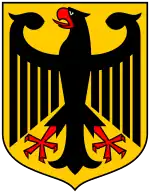
.svg.png.webp)

